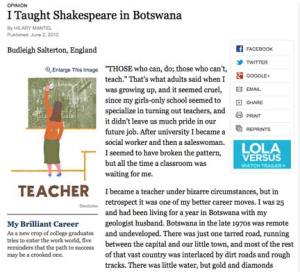by Julie Dodd
JEA Mentoring Committee co-chair
 As food for thought for those graduating from college and entering the job market, The New York Times featured essays from five successful professionals who were asked to write about their earliest jobs.
As food for thought for those graduating from college and entering the job market, The New York Times featured essays from five successful professionals who were asked to write about their earliest jobs.
Author Hilary Mantel wrote about one of her earliest jobs – being an English teacher in Botswana. She was living in Botswana with her geologist husband and was recruited to cover classes the first weeks of school for a teacher from India who had been hired but had yet to arrive.
When the expected teacher never arrived, Mantel, who was 25 at the time, got the job.
After discussing the experiences of that year of teaching, she writes, “I found teaching hard work, the hardest job I’ve done.”
She quit teaching after one year not because of the hard work or some of the heartbreaking situations of the students but because of being “demoralized by the school’s atmosphere.”
Her reflections about teaching forty years ago hold true today.
Teaching is hard work.
The school atmosphere can be the factor that determines whether a teacher continues in the profession, not the accomplishments of the teacher and her students.
As someone who taught for one year, Mantel writes, “I am not sure how people find the personal resources for a lifetime of teaching.”
As we know from the JEA Mentoring Program, some new teachers leave the profession due to issues not related to their teaching outlook or success – they are pink-slipped due to school budget cuts or they resign to move for a spouse’s new job location.
But what we are trying to create through the Mentoring Program are teachers who not only survive that first year but thrive in teaching and go on to become educational leaders.
As a mentor, what are the “personal resources” you had for a lifetime of teaching and how you can help your mentees develop their own resources for career-long teaching success?
